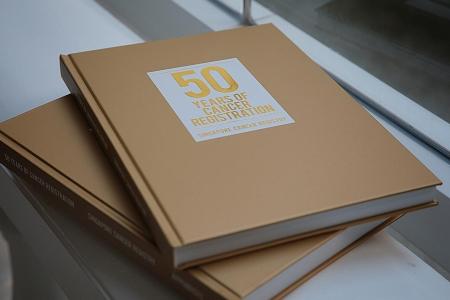Book tracing 50 years of cancer trends launched
The cancer rate for women has gone up by almost 50 per cent over the past 50 years, but has remained fairly constant for men, when age is taken into account.
The main reason is a significant drop in lung cancer cases for men, as fewer men now smoke. Smoking is a major cause of lung cancer.
This has offset increases that men face with other cancers. One example is prostate cancer, which has gone up sevenfold in the past half century as men here now live longer lives, and age is a major risk factor for this cancer.
Meanwhile, breast cancer in women has more than tripled in that period, said Professor Chia Kee Seng, a senior epidemiologist, as he highlighted some trends reported in the Singapore Cancer Registry (SCR) 50th Anniversary monograph, a two-volume book.
Speaking at the launch of the monograph at the Ministry of Health building yesterday, he said: "It will continue to increase because the risk factors (late age of first pregnancy and having fewer babies) are difficult to modify."
The good news is that if discovered early, breast cancer is highly curable. However, only 30 per cent of women here discover their cancer in the early stages compared with 60 per cent of women in the US.
Compared with 50 years ago, the 10-year survival rate for all cancer patients has improved from 26 per cent to 54 per cent for women, and from 13 per cent to 46 per cent for men.
At yesterday's event, Health Minister Gan Kim Yong gave a signed copy of the monograph to the family of the late Emeritus Professor K. Shanmugaratnam, who founded the Singapore Cancer Registry in 1968.
It is the oldest of four disease registries here. The others are for heart attacks, kidney failure and stroke.
Said Mr Gan: "Through the pioneering work of its founder, the late Emeritus Professor K. Shanmugaratnam, what started as a simple card index registry at the National University of Singapore's Department of Pathology in 1950 has grown into a robust population-based cancer registry."
Prof Shanmugaratnam, a pathologist, retired at the age of 94 but continued to teach at the National University of Singapore. He died last year at the age of 97.
Mr Gan said cancer, which is the top killer here, has a significant social and economic impact on patients, their families, the healthcare system and society. He said the number of cancer cases here has gone up nearly six times in the last 50 years, "largely because of Singapore's growing, and ageing population".
He added: "A robust cancer surveillance system can provide a better understanding of the scale and profile of cancers in Singapore, and is instrumental in developing an appropriate framework for action - be it for primary prevention, early detection or in the delivery of cancer treatment. It also allows us to assess the efficacy of cancer control measures and the healthcare system as a whole."
Get The New Paper on your phone with the free TNP app. Download from the Apple App Store or Google Play Store now



